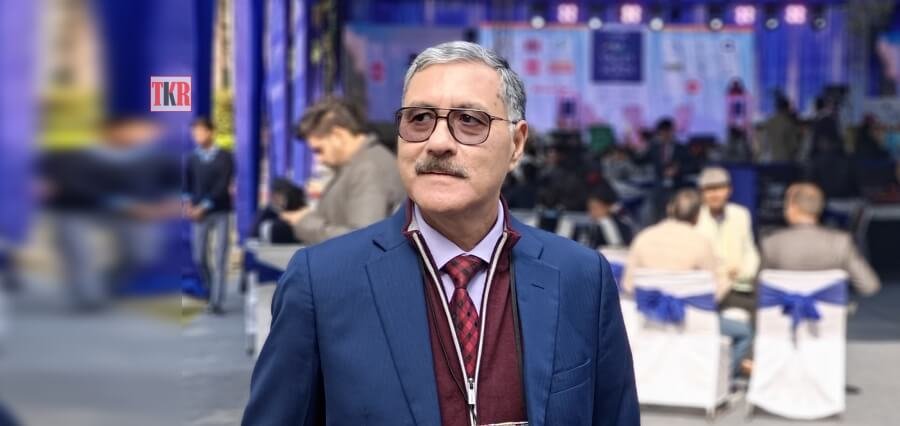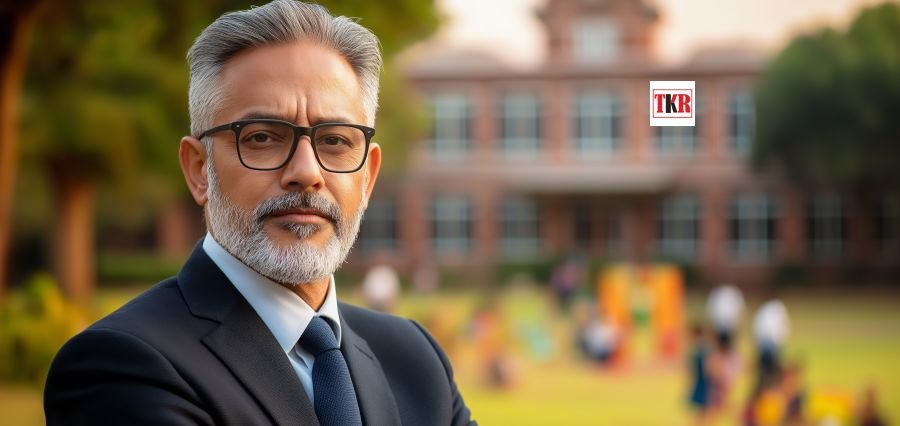In this exclusive conversation, Ms. Khushboo Agrahari sits down with Mr. Manoj Barthwal, Former Executive Director of ONGC and a global mentor, to explore a remarkable journey — from leading India’s energy corridors to igniting inner clarity in boardrooms and classrooms around the world. With 37 years of leadership experience at ONGC and a deep grounding in Indian wisdom, Mr. Barthwal has redefined success through service, strategy through spirituality, and discipline through purpose. His story is not just about professional transformation, but also about personal awakening, offering insights that bridge ancient values with modern leadership challenges.
- You dedicated 37 years to ONGC, shaping India’s energy sector and leading from the front. What were some defining moments in that journey that still influence your approach to leadership and mentorship today?
Before joining ONGC in 1985, I began my career as a journalist, working with newspapers, hosting radio programs, and participating in television shows. It was a vibrant and expressive phase of my life, rooted in communication and creativity. But stepping into ONGC marked the beginning of an entirely new chapter — one filled with purpose, discipline, and transformation.
What stood out immediately at ONGC was the culture of mentorship. Over time, I discovered that leadership is not just about giving directions — it’s about sharing knowledge, inspiring others, and being open to learning at every stage.
One of the most defining lessons I carry with me is how institutional wisdom is passed from one generation to the next. ONGC taught me that true mentorship lies in enabling others to grow and lead. These values continue to guide me today, as I strive to mentor young minds with the same sincerity and commitment that I once received.
- After retiring as Executive Director from ONGC, you chose a path of mentoring, training, and guiding professionals across the world. What motivated you to shift your focus from managing energy to energising people?
In every meeting, field visits and interaction, I always sensed a deeper energy—the one that powers purpose. Transitioning to mentoring felt like evolution, not retirement. I had harvested insights, not just results. The world today seeks inner stamina as much as outer success, and that’s where my calling matured—from managing external environment to managing internal human resources and Policy Formulation. People don’t lack resources; they seek direction. My role became to ignite that compass within them.
- From Fields to meetings and international conferences, and training halls—your journey has been vast and diverse. How do you tailor your leadership teachings for different audiences, from corporate CEOs to young graduates?
Leadership is context with character. With CEOs, I speak of strategy, stakeholder integrity, and the legacy question: What will outlive you? With young graduates, I activate awareness—who you are before what you do. My delivery adapts, but my intent remains singular: to awaken inner alignment. I bring ancient wisdom and contemporary logic to the table, so that both a millennial in Mumbai and a policymaker in Delhi or Dubai find actionable depth.
- You have delivered soft skills and resilience training in multiple countries. What are some core Indian leadership values or philosophies that resonate with global audiences today?
In my global training sessions, I often draw upon timeless Indian values that deeply connect with diverse audiences — especially the emphasis on purpose-driven leadership and shared prosperity.
A guiding verse I frequently reference is:
“न त्वहं कामये राज्यं न स्वर्गं नापुनर्भवम् । कामये दुःखतप्तानां प्राणिनामार्तिनाशनम् ॥”
“I seek neither kingdom, nor heaven, nor rebirth. What I seek is the welfare of all beings.”
This philosophy teaches that leadership is about alleviating suffering, generating employment, and creating impact — not accumulating wealth for personal or generational gain. Wealth must circulate to uplift society.
These Indian ideals of selfless service, resilience, and inclusive growth have universal relevance and form the core of what I impart globally.
- As a board member of prestigious institutions, how do you see the future of corporate governance evolving? What role should ethical leadership and spiritual wisdom play in shaping our institutions?
Governance is entering a phase where wisdom is valued more than just compliance. Future institutions will stand on the tripod of transparency, empathy, and foresight. Ethical leadership must be practiced, not merely preached. Spiritual intelligence brings emotional clarity and decisiveness rooted in dharma. This convergence of ethics and elevated consciousness will distinguish enduring institutions from transactional ones.
- Many people know you as a storyteller from your lecture series which are drawn from the Vedas, Panchatantra, and Indian mythology. How do you use these ancient tales to teach modern concepts like emotional intelligence, conflict resolution, or decision-making?
I often turn to classical Indian literature to bring out timeless leadership values. One such example is from Raghuvaṃśh Mahākāvyam by Kalidasa, where he narrates the story of King Dileepa — an ancestor of Lord Rama. When Dileepa desired a child, a sage advised him to go to the forest and serve a cow — an act known as Dileepasya Go-Seva.
Kālidāsa, one of the greatest poets and dramatists of ancient India, composed three literary masterpieces: Raghuvaṃśa Mahākāvya, Kumāra Sambhavam, and Meghadūtam. His writings are a treasure trove of wisdom, ethics, and philosophical depth that continue to inspire generations.
In Raghuvaṃśa, while describing King Dilīpa — the noble ancestor of Lord Rāma — Kālidāsa writes:
प्रजानां एव भूत्यर्थं स ताभ्यो बलिमग्रहीत् ।
सहस्रगुणमुत्स्रष्टुमदत्ते हि रसं रविः ॥
“He accepted taxes from his people solely for their well-being, just as the sun draws up water only to return it a thousandfold as rain.”
This verse beautifully captures the essence of ethical leadership. At a time when modern-day business tycoons may accumulate vast personal wealth and travel in private jets, Kālidāsa reminds us of a higher ideal — where a ruler or leader collects resources not for self-indulgence, but to multiply them and return them for the prosperity of the people. King Dilīpa’s actions reflect a governance model rooted in service, responsibility, and compassion — values as relevant today as they were in ancient times.
- In your experience training professionals, what do you believe is the biggest challenge people face internally today and how can one overcome it with clarity and courage?
In today’s fast-paced world, the biggest internal challenge professionals face is a short attention span, driven by constant distractions. Added to this is the flood of information — too much data, too little meaning. And perhaps most significantly, the desire to be constantly noticed has taken center stage.
These factors create restlessness and cloud clarity of thought. But meaningful outcomes — whether personal or professional — require patience, focus, and inner peace. One must learn to pause, reflect, and stay centered amidst noise. With discipline and self-awareness, clarity emerges, and courage naturally follows.
- Looking back, if you could give one piece of advice to your 30-year-old self during your ONGC days, what would it be? And what message would you like to give to the youth of India today?
If I could speak to my 30-year-old self, I would say — enjoy every phase of life with awareness. Life, like driving a car, requires different speeds for different terrains. When you’re navigating hilly paths, you must slow down and stay focused; you can’t drive at the same speed as on a highway. Similarly, in life, there are moments to pause, reflect, and proceed with care — and that’s perfectly okay.
On a personal level, I’ve embraced both the highs and the lows. In fact, failures have often been better teachers than success. They shape resilience, humility, and character.
To the youth of India, my message is: don’t rush through life. Build depth, not just speed. In a world obsessed with quick results, its inner clarity, patience, and perseverance that will help you go the distance.
- In today’s hyper-connected world, burnout and decision fatigue are becoming common across all levels—from students to CEOs. From your own life and training modules, what are three practical techniques you recommend to maintain clarity, energy, and emotional balance?
Burnout is real and growing. Over the years, I’ve found three simple yet powerful practices that help restore clarity, energy, and emotional balance:
Sharpen your awareness. Sit still, close your eyes, and try to identify the faintest sound around you — a distant bird, a ticking clock, even your breath. This brings your scattered mind back to focus. It’s a grounding exercise I recommend to all.
Understand stress to de-stress. Lie down quietly and imagine the worst possible outcome you fear. Then shift your attention to all that you still have. This contrast creates instant mental relief and reframes your perspective.
Take long, solitary walks. Walking alone without distractions helps your thoughts settle. It’s a form of moving meditation that brings surprising clarity over time.
These small practices, done consistently, can make a big difference — not just in performance, but in peace of mind.
- If you were to design a “Life Curriculum” for schools or corporates combining ONGC-style discipline, Panchatantra wisdom, and modern leadership, what would its 5 pillars be, and how can readers start applying at least one of them from today itself?
If I were to design a Life Curriculum, it would blend structured discipline, timeless Indian wisdom, and practical skills for the 21st century. These five pillars would form its core:
Respect the Environment: Students and professionals must be taught early to value nature. From conserving water to reducing waste, environmental respect fosters responsibility.
Plant Trees, Create Life: Simple acts like planting trees should become rituals. It’s a powerful way to nurture patience, purpose, and contribution to future generations.
Avoid Junk Food: Eat for Energy, Not Just Taste – Nutrition education should be a foundation. A healthy body leads to a focused and balanced mind.
Daily Sports & Play: Physical activity should not be optional. Sports teach teamwork, discipline, and resilience — traits essential in any profession.
Ask More Questions, Find Creative Solutions: Curiosity is the seed of innovation. Whether you’re in school or a boardroom, asking the right questions is more valuable than memorising answers.
Start today by choosing just one: go for a 20-minute walk, replace a junk snack with fruit, or plant a sapling. Change doesn’t require grand gestures — just consistent steps in the right direction.
- As someone who values both sports and law, what role do you believe sports can play in shaping leadership qualities among today’s students, especially in emerging institutions like sports universities?
Sports are vital for developing leadership qualities like teamwork, discipline, and resilience. At ONGC, I saw this firsthand — multidisciplinary teams had to work in perfect sync, much like on a sports field. I was also part of the organising team that supported ONGC officers who successfully climbed Mount Everest — a proud testament to collective strength and spirit.
Sports also help reduce stress and build camaraderie, making them essential in education. And just as we must learn teamwork through sports, we must also understand the law, because the law is for all, and knowing it empowers responsible citizenship.
Sports universities, therefore, aren’t just shaping athletes — they’re shaping future leaders.





